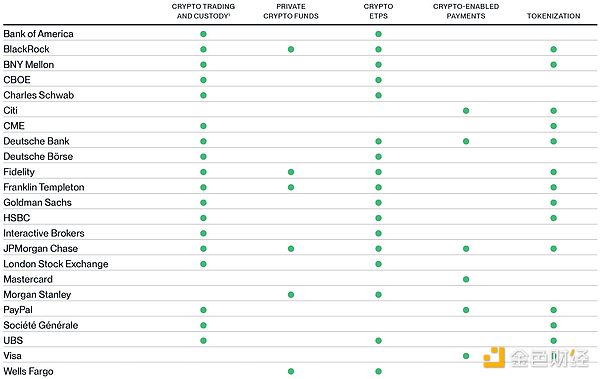Author: Matt Hougan, Chief Investment Officer of Bitwise; Translator: AIMan@Golden Finance
Summary:
This week, multiple bills supporting cryptocurrencies were advanced in Washington, and the era of cryptocurrencies will be completely changed, and this is a good thing.
Want to know why Bitcoin has repeatedly broken all-time highs?
There are many reasons, including continued demand from institutional investors and corporate finance departments. But there is one reason that has not received enough attention: Washington is ushering in "Crypto Week", and you will see a lot of news headlines supporting cryptocurrencies in the next few days.
I'm not making this up. On July 3, the U.S. House of Representatives issued a little-reported but influential press release, officially declaring the week of July 14 “Crypto Week” and promising to advance three key crypto bills:
The GENIUS Act: Providing a clear regulatory framework for stablecoins
The CLARITY Act: An overarching framework for the regulation of crypto assets
The Anti-CBDC Surveillance State Act: Prohibiting the creation of a central bank digital currency in the United States
The GENIUS Act has passed the Senate and, if it passes the House, will be sent to the President for his signature, making it the first major cryptocurrency legislation in U.S. history.
Both the CLARITY Act and the Anti-CBDC Act still require Senate approval, but passage of either in the House would be a significant milestone.
Why This Matters for Crypto
I firmly believe that the passage of a pro-crypto bill in the United States would significantly advance the development of cryptocurrencies and reduce their future risks.
The development implications are well understood and widely discussed. Clear cryptocurrency legislation will better incentivize large financial institutions to get involved in the crypto space, bringing billions of dollars of investment into crypto assets and guiding trillions of dollars of traditional assets onto the blockchain track. If you have ever wondered what would happen to crypto if JPMorgan Chase, BNY Mellon, and Nasdaq were free to participate in this space, the answer is about to be revealed.
But I think the more significant impact of this legislation lies in the risk level and how it will change the way crypto assets are traded.
One of the biggest headwinds facing cryptocurrencies is the constant exposure of major failures: FTX, Luna, Three Arrows Capital, Genesis, Celsius, QuadrigaCX, BitConnect, Mt. Gox.
Each failure has hindered the development of the cryptocurrency industry and reduced investor trust. And these failures are largely due to the lack of clear regulation of cryptocurrencies.
Offshore exchanges like FTX, which have poor internal controls and audit loopholes, would not have grown if there was clear regulation allowing safer versions to exist in the onshore market.
If large banks can custody crypto assets, investors will not avoid cryptocurrencies due to custody issues.
If there were regulations like the GENIUS Act, Ponzi stablecoins like Luna would never have happened.
Obviously, clear rules can’t prevent all scandals, as evidenced by the traditional financial industry. Clear rules didn’t prevent Bernie Madoff’s scam, nor did they prevent the series of misconduct that led to the collapse of Credit Suisse. But rules do help a lot.
One of the issues that keeps investors away from cryptocurrencies is the large declines we see in Bitcoin and other crypto assets. Bitcoin has been the best performing asset in the world over the past 15 years, but it has also experienced seven declines of 70% or more.
It’s hard for professional investors to buy an asset that could plummet 70% due to an unexpected scandal at an unregulated offshore venue. With these crypto bills being considered in Washington, I think the probability of such a scandal will drop significantly.
The passage of strong crypto bills won’t eliminate volatility in the market. But if they are passed, I don’t think cryptocurrencies will ever see another 70% or more decline.
The passage of strong crypto bills won’t eliminate volatility. But if they are passed, I don’t think we’ll ever see another 70% or more decline in cryptocurrencies.
Why I’m Not Worried About Cryptocurrency’s Political Future
People always ask when it comes to cryptocurrency legislation: Aren’t you worried that the next administration will reverse these gains?
In short: No.
Contrary to media reports, cryptocurrency is one of the few policy issues that has bipartisan support. The GENIUS Act passed the Senate by a vote of 68 to 30, with 18 Democrats voting in favor. It is one of the most bipartisan bills to pass the Senate during the 2025 Congressional session. There are many reasons for the bipartisan support, including the popularity of cryptocurrency among young voters. But the most important reason may be the support of the U.S. financial industry—traditionally a major funder of the Democratic Party, they are eager to take advantage of the growth and opportunities that cryptocurrency brings.
This financial motivation is the core reason why I believe Washington’s pro-cryptocurrency bias is sustainable in the long term. As more investors and companies get involved in the cryptocurrency space, it becomes increasingly difficult for politicians to unite against it.
Think about it: Today, almost every major financial institution in the United States has some level of cryptocurrency business. If BlackRock, JPMorgan, Morgan Stanley, thousands of American companies and millions of Americans are heavily invested in cryptocurrencies, it is hard to imagine that politicians will reverse this trend.
Institutional adoption of cryptocurrencies (including trading of crypto spot, futures and derivatives)

Source: Bitwise Asset Management data (as of June 30, 2025)
In other words: once the genie is opened, it can never be closed again. If these bills pass Congress during "Crypto Week" and are ultimately signed into law, we have entered a new era.
Cryptocurrencies are going mainstream, risks are decreasing, and Wall Street is jumping into the space in a big way.
No wonder we are at all-time highs.
 Catherine
Catherine
 Catherine
Catherine Joy
Joy YouQuan
YouQuan Clement
Clement Jasper
Jasper Hui Xin
Hui Xin Kikyo
Kikyo Aaron
Aaron Clement
Clement Jixu
Jixu